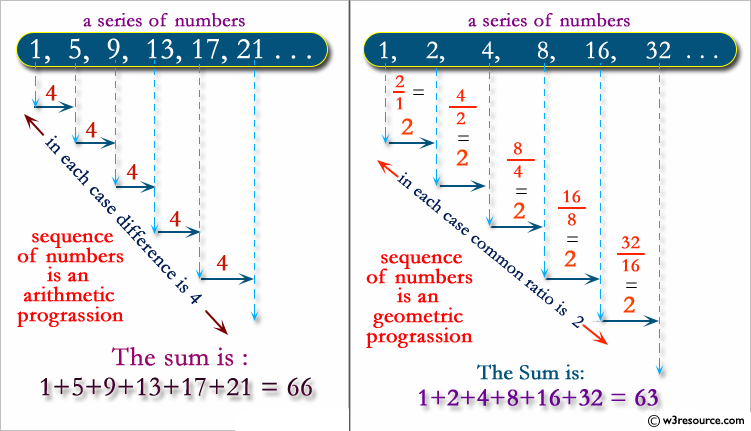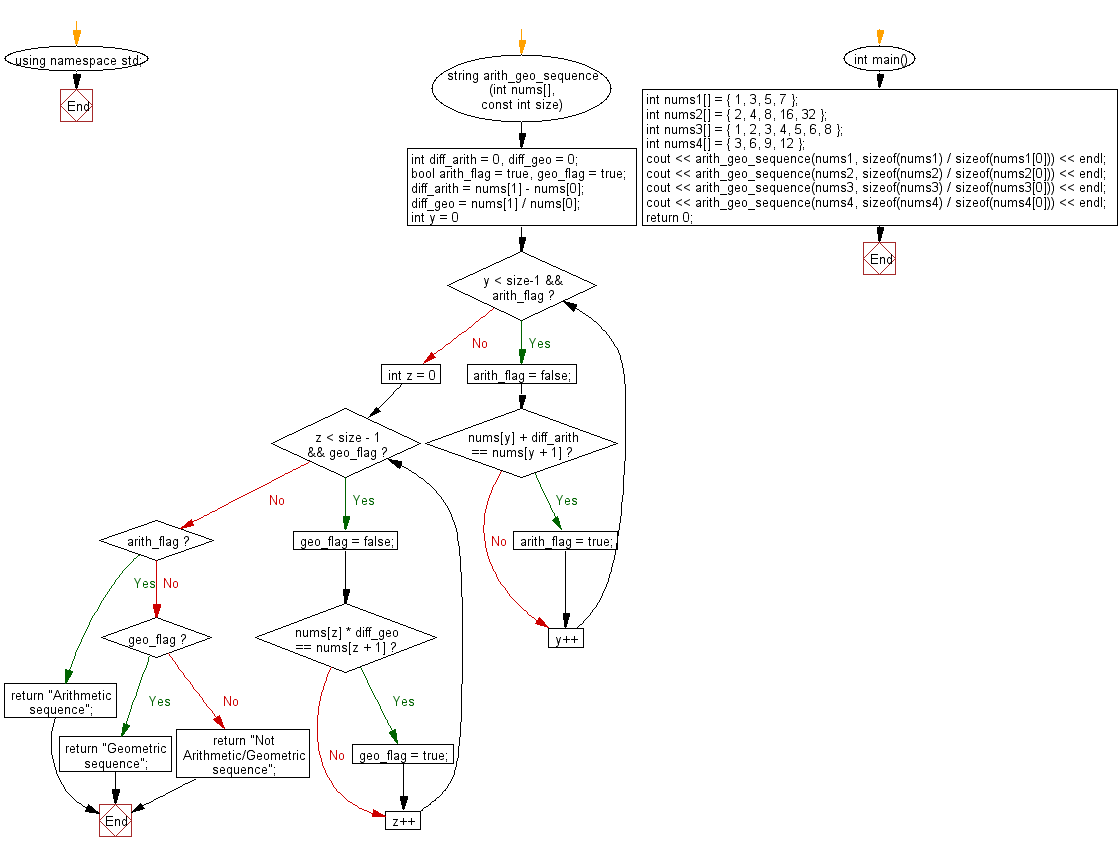C++ Exercises: Check whether the sequence of the numbers in a given array is a “Arithmetic” or “Geometric” sequence
Check Arithmetic or Geometric Sequence
Write a C++ program to check whether the sequence of the numbers in a given array is an "Arithmetic" or "Geometric" sequence. Return -1 if the sequence is not "Arithmetic" or "Geometric".
From Wikipedia
In mathematics, an arithmetic progression (AP) or arithmetic sequence is a sequence of numbers such that the difference between the consecutive terms is constant. Difference here means the second minus the first. For instance, the sequence 5, 7, 9, 11, 13, 15, . . . is an arithmetic progression with common difference of 2.
In mathematics, a geometric progression, also known as a geometric sequence, is a sequence of numbers where each term after the first is found by multiplying the previous one by a fixed, non-zero number called the common ratio. For example, the sequence 2, 6, 18, 54, ... is a geometric progression with common ratio 3. Similarly 10, 5, 2.5, 1.25, ... is a geometric sequence with common ratio 1/2.
Visual Presentation:

Sample Solution:
C++ Code :
#include <iostream>
#include <string>
using namespace std;
// Function to identify arithmetic or geometric sequences
string arith_geo_sequence(int nums[], const int size) {
// Variables to hold differences for arithmetic and geometric sequences
int diff_arith = 0, diff_geo = 0;
// Flags to identify if the sequence is arithmetic or geometric
bool arith_flag = true, geo_flag = true;
// Calculate differences between consecutive elements
diff_arith = nums[1] - nums[0];
diff_geo = nums[1] / nums[0];
// Check for arithmetic sequence
for (int y = 0; y < size - 1 && arith_flag; y++) {
arith_flag = false;
if (nums[y] + diff_arith == nums[y + 1]) {
arith_flag = true;
}
}
// Check for geometric sequence
for (int z = 0; z < size - 1 && geo_flag; z++) {
geo_flag = false;
if (nums[z] * diff_geo == nums[z + 1]) {
geo_flag = true;
}
}
// Return appropriate result based on the identified sequence
if (arith_flag) {
return "Arithmetic sequence";
} else if (geo_flag) {
return "Geometric sequence";
} else {
return "Not Arithmetic/Geometric sequence";
}
}
int main() {
// Different arrays to test for arithmetic or geometric sequence
int nums1[] = { 1, 3, 5, 7 };
int nums2[] = { 2, 4, 8, 16, 32 };
int nums3[] = { 1, 2, 3, 4, 5, 6, 8 };
int nums4[] = { 3, 6, 9, 12 };
// Function calls to identify sequence types for each array and print the result
cout << arith_geo_sequence(nums1, sizeof(nums1) / sizeof(nums1[0])) << endl;
cout << arith_geo_sequence(nums2, sizeof(nums2) / sizeof(nums2[0])) << endl;
cout << arith_geo_sequence(nums3, sizeof(nums3) / sizeof(nums3[0])) << endl;
cout << arith_geo_sequence(nums4, sizeof(nums4) / sizeof(nums4[0])) << endl;
return 0;
}
Sample Output:
Arithmetic sequence Geometric sequence Not Arithmetic/Geometric sequence Arithmetic sequence
Flowchart:

For more Practice: Solve these Related Problems:
- Write a C++ program to check if a given sequence of numbers forms an arithmetic progression by computing the common difference.
- Write a C++ program that determines whether an array of numbers is a geometric sequence using ratio comparisons with a tolerance.
- Write a C++ program to analyze a sequence and print whether it is arithmetic, geometric, or neither, using user-defined functions.
- Write a C++ program that reads a sequence of numbers and checks for both arithmetic and geometric progression properties, returning a specific value if neither.
Go to:
PREV : Convert Number to Hours and Minutes.
NEXT : Minutes Between Two Times.
C++ Code Editor:
Have another way to solve this solution? Contribute your code (and comments) through Disqus.
What is the difficulty level of this exercise?
